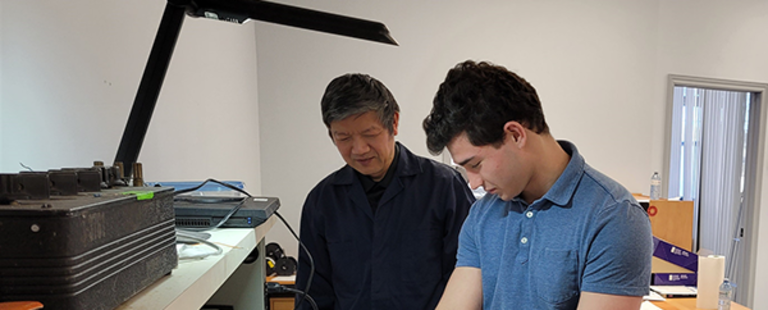Nominal Controls Contributes to Advancements in Space Industry With New Testing Rig Delivery
Fast forward to today, Nominal Controls is celebrating its 7th year as a company. After recently delivering a solid-state test rig for one of Elon Musk’s companies, Nominal Controls officially begin R&D of aerospace/space variants of their solid-state contactors.

Peter Zhang first began working with electrical controls at the age of 18 as a quality control intern. His passion was inspired by his father Mike Zhang, who at the time was running his own private research lab.
“My father was an electronics engineer with over 20 years of experience who had previously served General Electric, Toyota Group, and Schneider Electric,” said Peter. In 2008, he established his own research lab in an attempt to solve the toughest industrial controls problems such as sensor accuracy loss due to extreme temperatures.”
When Peter began attending university to study both space science and business administration, His father became heavily invested in the research and development of DC power electronics. After several successful breakthroughs, Peter had the idea of building his own company to bring to market his dad’s inventions.
“In 2016, what started as an engineer's passion for electronics research, became a mission to deliver unique, effective, and efficient solutions that benefit entire industries,” said Peter. “That is why I launched Nominal Controls.”
DC contactor is a key component of DC power electronic systems. There are five key industries for high current DC contactors: Industrial Machineries, Renewable Energy, Automotive, Marine, and Aerospace. Electromechanical contractors have long dominated these industries. However, they’ve always had issues of physical wear and tear, thus limiting their lifespan, and requiring constant maintenance and replacements.
To solve this issue, Peter, Mike, and their new team member Paul Bridger, a former semiconductor engineer at International Rectifier, are experimenting with solid-state DC contactors – an alternative semiconductor-based contactor for controlling DC systems. Since solid-state contactors don’t contain any moving parts, they do not arc, wear, or generate noises during operations.
“Our focus quickly became research, development, and production of various solid-state switches,” said Peter. “We spent the next few years perfecting this tech so we could provide a more reliable and long-lasting alternative to electromechanical contactors. With solid-state switches, not only are we addressing the problem of the switch’s lifespan, there are now new applications that are only feasible with the latest semiconductor technology."
In 2019, Nominal controls enrolled in AC:Incubate to grow their business.
“We couldn’t work out of our home office forever,” said Peter. “The AC is known to be the best in Canada, and Waterloo Region in general has a reputation for very focused tech research with very few distractions. Shortly after joining, we were connected with our first investor, so that was really cool!”
Fast forward to today, Nominal Controls is celebrating its 7th year as a company. After recently delivering a solid-state test rig for one of Elon Musk’s companies, Nominal Controls officially begin R&D of aerospace/space variants of their solid-state contactors.
“This latest test rig developed for aerospace clients pushes our technology to the limit. Our team has produced cutting-edge solutions for the space industry that are being used for ground testing today,” said Peter. “Currently, we have some projects related to aviation in the works. Our next milestone is the design of space-grade solid-state control systems for future spacecraft and operating bases.”